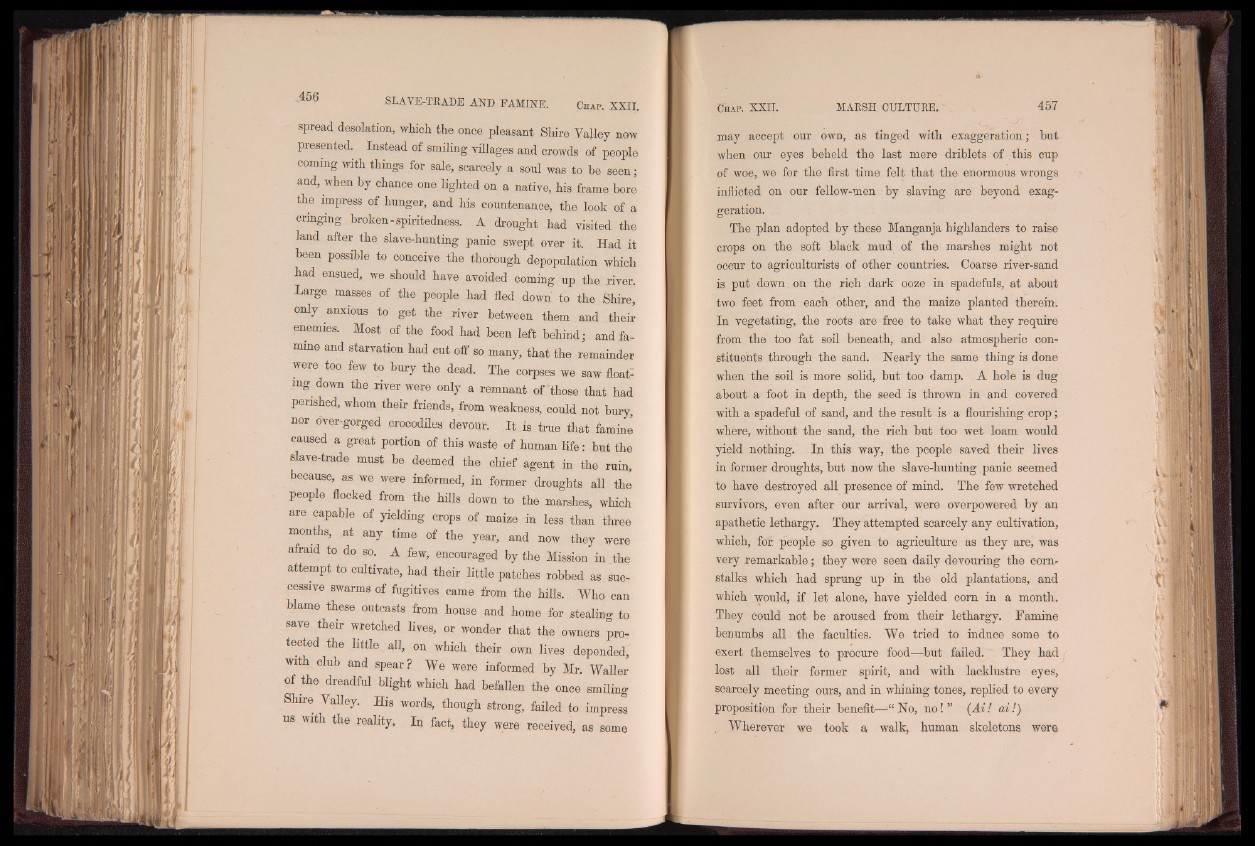
spread desolation, which the once pleasant Shire Vajley now
presented. Instead of smiling villages and crowds of people
coming with things for sale, scarcely a soul was to be seen;
and, when by chance one lighted on a native, his frame bore
the impress of hunger, and his countenance, the look of a
cringing broken-spiritedness. A drought had visited the
land after the slave-hunting panic swept over it. Had it
been possible to conceive the thorough depopulation which
had ensued, we should have avoided coming up the river.
Large masses of the people had fled down to the Shire,
only anxious to get the river between them and their
enemies. Most of the food had been left behind; and famine
and starvation had cut off so many, that the remainder
were too few to bury the dead. The corpses we saw float:
mg down the river were only a remnant of'those that had
perished, whom their friends, from weakness, could not bury,
nor over-gorged crocodiles devour. I t is true that famine
caused a great portion of this waste of human life: but the
slave-trade must be deemed the chief agent in the ruin,
because, as we were informed, in former droughts all the
people flocked from the hills down to the marshes, which
are capable of yielding crops of maize in less than three
months, at any time of the year, and now they were
afraid to do so. A few, encouraged by the Mission in the
attempt to cultivate, had their little patches robbed as successive
swarms of fugitives came from the hills. Who can
blame these outcasts from house and home for stealing to
save their wretched lives, or wonder that the owners protected
the little all, on which their own lives depended,
with club and spear? We were informed by Mr. Waller
of the dreadful blight which had befallen the once smiling
Shire Valley. His words, though strong, failed to impress
us with the reality. In fact, they were received, as some
may accept our own, as tinged with exaggeration; but
when our eyes beheld the last mere driblets of this cup
of woe, we for the first time felt that the enormous wrongs
inflicted on our fellow-men by slaving are beyond exaggeration.
The plan adopted by these Manganja highlanders to raise
crops on the soft black mud of the marshes might not
occur to agriculturists of other countries. Coarse, river-sand
is put down on the rich dark ooze in spadefuls, at about
two feet from each other, and the maize planted therein.
In vegetating, the roots are free to take what they require
from the too fat soil beneath, and also atmospheric constituents
through the sand. Nearly the same thing is done
when the soil is more solid, but too damp. A hole is dug
about a foot in depth, the seed is thrown in and covered
with a spadeful of sand, and the result is a flourishing crop;
where, without the sand, the rich but too wet loam would
yield nothing. In this way, the people saved their lives
in former droughts, but now the slave-hunting panic seemed
to have destroyed all presence of mind. The few wretched
survivors, even after our arrival, were overpowered by an
apathetic lethargy. They attempted scarcely any cultivation,
which, for. people so given to agriculture as they are, was
very remarkable; they were seen daily devouring the cornstalks
which had sprung up in the old plantations, and
which would, if let alone, have yielded corn in a month.
They could not be aroused from their lethargy. Famine
benumbs all the faculties. We tried to induce some to
exert themselves to procure food—but failed. They had
lost all their former spirit, and with lacklustre eyes,
scarcely meeting ours, and in whining tones, replied to every
proposition for their benefit—■“ No, n o ! ” (At! a i/)
. Wherever we took a walk, human skeletons were